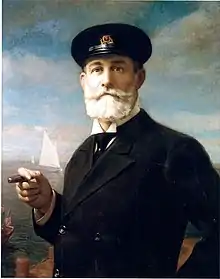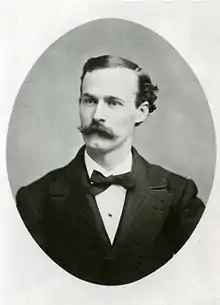James Walter Thompson
James Walter Thompson (October 28, 1847 – October 16, 1928) was the founder of the J. Walter Thompson advertising agency and a pioneer of many advertising techniques.[1]
James Walter Thompson | |
|---|---|
 Thompson in 1910 | |
| Born | 28 Oct 1847 Pittsfield, Massachusetts, United States |
| Died | October 16, 1928 (aged 80) New York, New York, United States |
| Resting place | Woodlawn Cemetery. Bronx, New York, United States 40.892162°N 73.872292°W |
| Nationality | American |
| Other names | J. Walter Thompson |
| Occupation | Advertiser |
| Known for | Owning and operating the J. Walter Thompson advertising agency |
| Military career | |
| Allegiance | |
| Service/ | |
| Years of service | 3 |
| Rank | Landsman, Seaman |
| Signature | |
Biography

He was born in Pittsfield, Massachusetts, on October 28, 1847.
In 1864, William James Carlton started selling advertising space in religious magazines. The agency was called Carlton and Smith, although almost nothing is known about the Smith partner. In 1868, Carlton hired Thompson as a bookkeeper. Eventually Thompson found that soliciting and sales were much more profitable, and he became a very effective salesman for the small company. In 1877, Thompson bought the agency for $500 (~$14,246 in 2023 terms[2]) and renamed it J. Walter Thompson Company. Thompson paid $800 for the Carlton and Smith furniture in the same transaction.
Realizing that he could sell more space if the company provided the service of developing content for advertisers, Thompson hired writers and artists to form the first known creative department in an advertising agency. He is credited as the "father of modern magazine advertising" in the United States.
Thompson, having served on the USS Saratoga in the Civil War, was a passionate sailor.[3] He owned a variety of vessels, including a seagoing houseboat and a steamboat (Stella). He headed the New York Yacht Club, for which his title as Commodore and his portrait became famous within the company. He lived at 11 East Sixty-eighth Street in Manhattan.

He developed the Roosevelt Manor section of Cranford in the 1890s and built the Cranford Opera House block in Cranford, New Jersey, for his wife, Margaret Riggs Boyle Thompson, in 1892.[4][5]
The J. Walter Thompson Company was incorporated in 1896. In 1899, Thompson opened an office in London. An avid traveler, Thompson went abroad nearly every summer for twenty years, and rarely came back without important accounts. He saw New York as "the flagship" office for a company with no geographical restrictions. "It has no limitations. Any spot on earth where goods are to be sold by advertising is inside the fence of the Thompson field", said Thompson.[1]
In 1900, JWT published a house ad explaining trademark advertising. This was the first known commercial explanation of what we now know as brand management. Thompson soon became known for his philosophy of drawing a straight line between the manufacturer and the consumer.
In 1916, Stanley B. Resor and several partners bought the company from the aging Thompson for $500,000 ($13,723,395 in 2023 terms[6]).
In 1930, a letter addressed to Thompson arrived from soon-to-be president, Franklin D. Roosevelt, asking for a job for his son, Elliott, guaranteeing that "he has a perfectly good mind"; JWT's mother was a distant cousin of FDR, but Thompson had died in 1928.[7] Elliott never did work for JWT.
Legacy
Thompson is responsible for some enduring brand images in popular culture, such as the Rock of Gibraltar used for the Prudential Insurance Company.
Today, JWT is one of the largest advertising agencies in the United States and the fourth-largest in the world. It is one of the key companies of Sir Martin Sorrell's WPP Group (NASDAQ:WPPGY) and is headquartered in New York. The global agency is led by Worldwide Chairman and Global CEO Bob Jeffrey, who took over the role in 1998.[8] JWT was named Adweek magazine's 2009 "Global Agency of the Year."[9]
In popular culture
Thompson plays a minor role in Jack Finney's Time and Again.
References
- "J. Walter Thompson Company (JWT) History". Library.duke.edu. 2006-06-29. Archived from the original on 2016-08-02. Retrieved 2012-03-09.
- "$500 in 1877 → 2023 | Inflation Calculator". www.in2013dollars.com. Retrieved 2023-03-11.
- U.S., Naval Enlistment Rendezvous, 1855-1891 [database on-line]. Provo, UT, USA: Ancestry.com Operations, Inc., 2014.
- Toniann Antonelli, Township Marks 100th Anniversary of 'Cranford's Great Fire': A century ago, an entire row of businesses known as The Opera House Block was destroyed in a massive fire downtown. Cranford Patch, February 3, 2012
- Guide to the J. Walter Thompson Company. Iconographic Collection, 1848-2005 and undated Duke University Libraries
- "$500,000 in 1916 → 2023 | Inflation Calculator". www.in2013dollars.com. Retrieved 2023-03-11.
- "J. Walter Thompson, Advertiser, Dead. Founder of Agency Bearing His Name Succumbs to Stroke in 81st Year. Was Pioneer In Field. He Early Recognized Importance of Magazine Covers for Advertising Use". the New York Times. October 18, 1928. Retrieved 2012-08-08.
James Walter Thompson, founder and until 1916 President of the advertising agency which bears his name, died at his home, 11 East Sixty-eighth Street, Tuesday night
- "Thompson New York was looking for a savior, and Bob Jeffrey intends to succeed at the job". New York Times. 1998-07-31. Retrieved 2012-03-09.
- McMains, Andrew. "JWT: Global Agency of the Year '09". Adweek. Retrieved 2012-03-09.